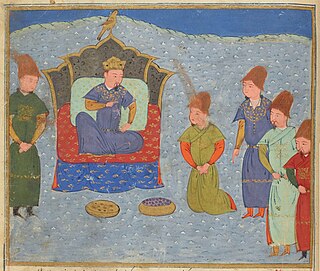
Batu Khan was a Mongol ruler and founder of the Golden Horde, a constituent of the Mongol Empire. Batu was a son of Jochi, thus a grandson of Genghis Khan. His ulus ruled over the Kievan Rus', Volga Bulgaria, Cumania, and the Caucasus for around 250 years.
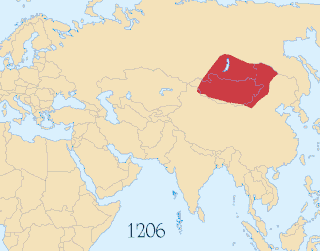
The Mongol Empire of the 13th and 14th centuries was the largest contiguous empire in history. Originating in present-day Mongolia in East Asia, the Mongol Empire at its height stretched from the Sea of Japan to parts of Eastern Europe, extending northward into parts of the Arctic; eastward and southward into parts of the Indian subcontinent, attempted invasions of Southeast Asia, and conquered the Iranian Plateau; and westward as far as the Levant and the Carpathian Mountains.

Ögedei Khan was the second ruler of the Mongol Empire. The third son of Genghis Khan, he continued the expansion of the empire that his father had begun.
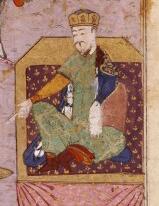
Güyük Khan was the third Khagan of the Mongol Empire, the eldest son of Ögedei Khan and a grandson of Genghis Khan. He reigned from 1246 to 1248. He started his military career by participating in the conquest of Eastern Xia and then later in the invasion of Europe. When his father died, he was enthroned as Khagan in 1246. During his almost two year reign, he reversed some of his mother's unpopular edicts and ordered an empire-wide census; he also held some authority in Eastern Europe, appointing Andrey II as the grand prince of Vladimir and giving the princely title of Kiev to Alexander Nevsky.

Möngke Khan was the fourth khagan of the Mongol Empire, ruling from 1 July 1251, to 11 August 1259. He was the first Khagan from the Toluid line, and made significant reforms to improve the administration of the Empire during his reign. Under Möngke, the Mongols conquered Iraq and Syria as well as the kingdom of Dali.
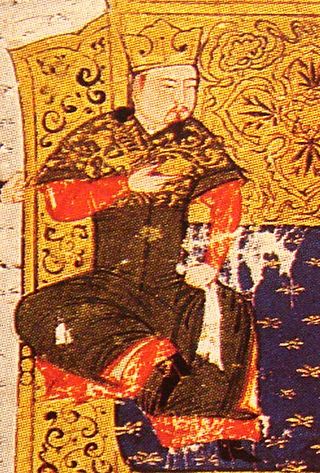
Tolui was the youngest son of Genghis Khan and Börte. A prominent general during the early Mongol conquests, Tolui was a leading candidate to succeed his father after his death in 1227 and ultimately served as regent of the Mongol Empire until the accession of his brother Ögedei two years later. Tolui's wife was Sorghaghtani Beki; their sons included Möngke and Kublai, the fourth and fifth khagans of the empire, and Hulagu, the founder of the Ilkhanate.

Töregene Khatun was the Great Khatun and regent of the Mongol Empire from the death of her husband Ögedei Khan in 1241 until the election of her eldest son Güyük Khan in 1246.
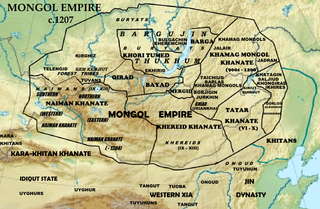
A Borjigin is a member of the Mongol sub-clan that started with Bodonchar Munkhag of the Kiyat clan. Yesugei's descendants were thus said to be Kiyat-Borjigin. The senior Borjigids provided ruling princes for Mongolia and Inner Mongolia until the 20th century. The clan formed the ruling class among the Mongols and some other peoples of Central Asia and Eastern Europe. Today, the Borjigid are found in most of Mongolia, Inner Mongolia and Xinjiang, and genetic research has shown that descent from Genghis Khan and Timur is common throughout Central Asia and other regions.

Ariq Böke, the components of his name also spelled Arigh, Arik and Bukha, Buka, was the seventh and youngest son of Tolui and a grandson of Genghis Khan. After the death of his brother the Great Khan Möngke, Ariq Böke claimed the title of the Great Khan of the Mongol Empire and briefly took power while his brothers Kublai and Hulagu were absent from the Mongolian Plateau. When Kublai returned for an election in 1260, rival factions could not agree, and elected both claimants, Kublai and Ariq Böke, to the throne, resulting in the Toluid Civil War that fragmented the Mongol Empire. Ariq Böke was supported by the traditionalists of the Mongol Empire, while his brother Kublai was supported by the senior princes of North China and Manchuria.

Kaidu was a grandson of the Mongol khagan Ögedei (1185–1241) and thus leader of the House of Ögedei and the de facto khan of the Chagatai Khanate, a division of the Mongol Empire. He ruled parts of modern-day Xinjiang and Central Asia during the 13th century, and actively opposed his uncle, Kublai, who established the Yuan dynasty. Medieval chroniclers often mistranslated Kadan as Kaidu, mistakenly placing Kaidu at the Battle of Legnica. Kadan was the brother of Güyük, and Kaidu's uncle.

Sorghaghtani Beki or Bekhi, also written Sorkaktani, Sorkhokhtani, Sorkhogtani, Siyurkuktiti, posthumous name Empress Xianyi Zhuangsheng, was a Keraite princess and daughter-in-law of Genghis Khan. Married to Tolui, Genghis' youngest son, Sorghaghtani Beki became one of the most powerful and competent people in the Mongol Empire. She made policy decisions at a pivotal moment that led to the transition of the Mongol Empire towards a more cosmopolitan and sophisticated style of administration. She raised her sons to be leaders and maneuvered the family politics so that all four of her sons, Möngke Khan, Hulagu Khan, Ariq Böke, and Kublai Khan, went on to inherit the legacy of their grandfather.

Berke Khan was a grandson of Genghis Khan from his son Jochi and a Mongol military commander and ruler of the Golden Horde who effectively consolidated the power of the Blue Horde and White Horde from 1257 to 1266. He succeeded his brother Batu Khan of the Blue Horde (West), and was responsible for the first official establishment of Islam in a khanate of the Mongol Empire. Following the Sack of Baghdad by Hulagu Khan, his cousin and head of the Mongol Ilkhanate based in Persia, he allied with the Egyptian Mamluks against Hulagu. Berke also supported Ariq Böke against Kublai in the Toluid Civil War, but did not intervene militarily in the war because he was occupied in his own war against Hulagu and the Ilkhanate.

Kadan was the son of the second Great Khan of the Mongols Ögedei and a concubine. He was the grandson of Genghis Khan and the brother of Güyük Khan. During the Mongol invasion of Europe, Kadan, along with Baidar and Orda Khan, led the Mongol diversionary force that attacked Poland, while the main Mongol force struck the Kingdom of Hungary.

The Berke–Hulagu war was fought between two Mongol leaders, Berke Khan of the Golden Horde and Hulagu Khan of the Ilkhanate. It was fought mostly in the Caucasus Mountains area in the 1260s after the destruction of Baghdad in 1258. The war overlaps with the Toluid Civil War in the Mongol Empire between two members of the Tolui family line, Kublai Khan and Ariq Böke, who both claimed the title of Great Khan (Khagan). Kublai allied with Hulagu, while Ariq Böke sided with Berke. Hulagu headed to Mongolia for the election of a new Khagan to succeed Möngke Khan, but the loss of the Battle of Ain Jalut to the Mamluks forced him to withdraw back to the Middle East. The Mamluk victory emboldened Berke to invade the Ilkhanate. The Berke–Hulagu war and the Toluid Civil War as well as the subsequent Kaidu–Kublai war marked a key moment in the fragmentation of the Mongol empire after the death of Möngke, the fourth Khan of the Mongol Empire.
Oghul Qaimish was the principal wife of Güyük Khan and ruled as regent over the Mongol Empire after the death of her husband in 1248. She was a descendant of the Mergid tribe. However, H. H. Howorth believed that she was an Oirat, mistaking her for Oghul Tutmish, wife of Möngke.

Kublai Khan, also known by his temple name as the Emperor Shizu of Yuan and his regnal name Setsen Khan, was the founder and first emperor of the Mongol-led Yuan dynasty of China. He proclaimed the dynastic name "Great Yuan" in 1271, and ruled Yuan China until his death in 1294.
Orghana was an Oirat princess of the Mongol Empire and Empress of the Chagatai Khanate. She was a daughter of Torolchi, chief of the Oirats and Checheyikhen, daughter of Genghis Khan. She served as regent in the name of her infant son from 1252 to 1261.
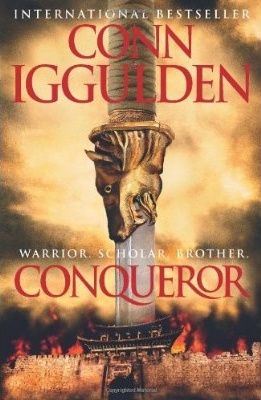
Conqueror is the fifth and final book of the Conqueror series written by Conn Iggulden. Conqueror tells the story of Kublai Khan – portrayed as one of the world's great leaders alongside Julius Caesar, Alexander the Great, and Napoleon Bonaparte. The story takes place between 1244 and 1260 AD.
The Toluid Civil War was a war of succession fought between Kublai Khan and his younger brother, Ariq Böke, from 1260 to 1264. Möngke Khan died in 1259 with no declared successor, precipitating infighting between members of the Tolui family line for the title of Great Khan that escalated to a civil war. The Toluid Civil War, and the wars that followed it, weakened the authority of the Great Khan over the Mongol Empire and split the empire into autonomous khanates.
The division of the Mongol Empire began after Möngke Khan died in 1259 in the siege of Diaoyu Castle with no declared successor, precipitating infighting between members of the Tolui family line for the title of khagan that escalated into the Toluid Civil War. This civil war, along with the Berke–Hulagu war and the subsequent Kaidu–Kublai war, greatly weakened the authority of the great khan over the entirety of the Mongol Empire, and the empire fractured into four khanates: the Golden Horde in Eastern Europe, the Chagatai Khanate in Central Asia, the Ilkhanate in Southwest Asia, and the Yuan dynasty in East Asia based in modern-day Beijing – although the Yuan emperors held the nominal title of khagan of the empire.
















